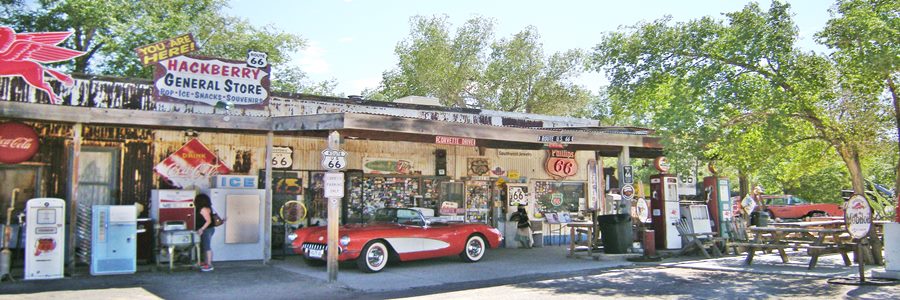Cadillac Ranch
Index to this page
- About The Cadillac Ranch
- Cadillac Ranch: Getting there
- Trivia & Facts
- The Cadillac Ranch Story
- Tailfin, the craze of post war America
- Cadillac Ranch Fire - 2019
- Imitations of the Cadillac Ranch
- Hotels
The Cadillac Ranch
Cadillac Ranch: Getting there
Map & directions to the Cadillac Ranch
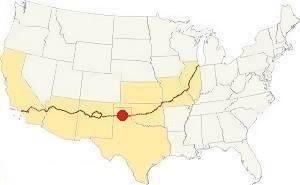
Map showing where Cadillac Ranch is located on U.S. Hwy. 66
This roadside landmark is on the south side of Interstate 40, just 10 miles southwest of Amarillo, Texas between the suburban towns of Soncy and Bushland.
For those driving eastwards. Take I-40 Exit 60 after passing Bushland and drive along South frontag. See this Map with directions.
Driving east from Amarillo leave old Route 66 at Hope Rd. and drive west along the South Frontage Rd, it is a two-way roadway. Coords: USGS 35.187276, -101.986898.
Facts, Trivia and useful information
Can you see Cadillac Ranch from the highway?
Yes, you can see the Cadillac Ranch from I-40; they are roughly 200 yards to the south of the South Frontage Road. See the image.
Cadillac Ranch Hours
It is free of charge and open 24 ⁄ 7.
Park your car next to the South Frontage and walk the 200 yards to the Cadillac Ranch across the field.
Warning: it may be muddy after rain or snow.
Front view of the Cadillacs
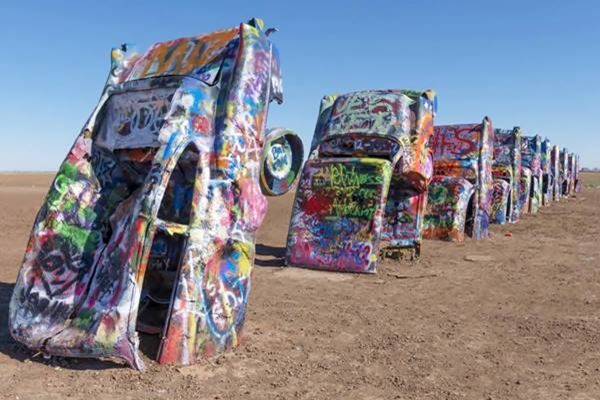
Cadillac Ranch. Some figures
- 10 cars are buried in a single file.
- East to West, they are aligned with an east to west orientation.
- They are Cadillacs. All cars are Cadillac models, from a 1948 to a 1963 (some say 1964) model.
- This isn't the original site; the cars were relocated 2 miles west of their original position in 1997.
Cadillac Ranch, a song by Bruce Springsteen
There is a well-known song that mentions the Cadillac Ranch. It is a track in the 1980 album, "The River."
Bruce Springsteen, contemporary American songwriter and performer, wrote this Rock song as an allegory of death and the impermanence of life.
The track is named (as expected) Cadillac Ranch, and uses the "ranch" as a metaphor for death, as the song itself deals with the inevitability of death. The Cadillacs, once glamorous symbols of wealth and luxury are now just car bodies stuck in the ground, rusting away, glory gone.

The Cadillac Ranch Story
What is it?
The Cadillac Ranch
The Amarillo Cadillac Ranch (also known as the Caddy Ranch), is a public art work, created in 1974, that is exhibited in open ranchland normally used for farming and breeding cattle.
It is the creation of a group of "underground" artists from San Francisco, known as the Ant Farm, it and was sponsored by Texas millionaire Stanley Marsh 3.
Marsh wanted a modern art work to perplex the local Amarilloans and the artists proposed a tribute to the evolution of the Cadillac tailfin.
This "work of art" consists of a group of 10 Cadillac cars buried nose-down in the ground, so that they can show off their tailfins, with an east to west alignment.
Each car belongs to a different model, from 1948 to 1963.
View of the "Caddy Ranch" or Cadillac Ranch with its Cadillacs buried nose down in the ground
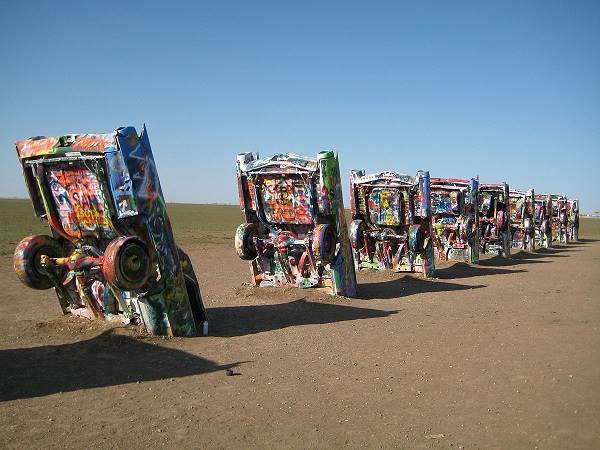
The artists: Ant Farm
Chip Lord (b. 1944) and Doug Michels (1943 - 2003) founded this media-based collective in San Francisco, in 1968. They were trying to create a group that could express their non-orthodox views on architecture, design and media. It was the Heyday of pop-art and counterculture.
The collective would incorporate Curtis Schreier and occasionally Douglas Hurr and Hudson Marquez.
They worked on media events, graphic arts, performances and videos in which they combined political criticism, irreverence with provocative pop culture.
They produced not only the Texas Cadillac Ranch, but also Media Burn (1975) in which they taped a Cadillac crashing into a wall built with TV sets that were set on fire.
The image below shows the placing of a car in the ground, pictured by Wyatt McSpadden who has recorded the artwork since its inception.

Ant Farm undertook large scale projects that incorporated iconic elements of American culture, especially the kitsch, as seen in the tailfin exhibit of buried Cadillacs in Amarillo.

1986 cattle grazing by a Cadillac. Wyatt McSpadden© AMOA
They estimated the cost would be $3,250; $250 to hire a backhoe to dig the holes and $300 for each of the ten cars. Their sponsor, Marsh provided the funds.
They recorded these "cultural happenings" on video and their work has been shown around the world: Haifa Museum, Israel, The Museum of Modern Art, New York, the Musee d'Art Moderne et Contemporain, Strasbourg, France, and Kunsthaus Zurich, Switzerland, just to mention a few sites.
A fire gutted their studio (Pier 40 in San Francisco) in 1978, and shortly after they disbanded.
The sponsor: Stanley Marsh 3
Texas businessman Stanley Marsh 3 (1938 - 2014) -who used the Arabic numeral "3" instead of the Roman numeral "III" because it seems too pretentious, was the third Stanley of the Marsh lineage. His grandfather, Stanley Marsh I, made a fortune with oil and gas development in the Texas Panhandle.
Stanley Marsh 3 was a controversial character who owned several media companies in Amarillo. Despite his support to colleges and art in its modern and non-conventional forms; he also sponsored the Amarillo Ramp, earthwork-art. His legacy is mixed due to a series of lawsuits that he faced in his final years.
Starting in the 1990s and continuing until 2013, he was taken to court on charges regarding alleged improper sexual behavior with teens, which were settled out of court.
One of the settlement statements (Feb. 21, 2013) mentioned that "...The Parties agree that Stanley Marsh 3 does not own the Cadillac Ranch. The Parties will have no further comment." It is likely that his estate was managed by someone else after strokes that left him incapacitated during 2012.
The Location of the Cadillac Ranch
Original location and relocation in 1997
Marsh provided the land where the cars were to be buried, on the south side of Interstate 40. Originally it was closer to Amarillo than the current location.
But as the city grew, the land became more valuable, so the cars were dug up in 1997 and hoisted out of the ground with cranes. The new site was selected two miles west of the original location, along I-40.
The original site can be seen in this aerial photo taken in 1985 where you can see the cars lined up. This is the map marking the spot of the original site.
The image below shows a car being hoisted out of the ground in 1997, pictured by Wyatt McSpadden.

The work of art
It has been a classic landmark on Route since 1974; it consists of ten classic Cadillac cars buried nose-down in the ground. Originally they had the regular paint of the buried cars, as you can see in the image below. But now, they are covered in multicolored graffiti and spray-painted (a practice which is allowed). Its official date of inauguration was June 21, 1974.
The cars are spaced out along a stretch of 140 ft. (42 m). They face west, they form a line.

The last car that the group bought was the 1949 Club Sedan model, and it was also the first car to be buried, it is the westernmost one of the group.
There is a sequence to the placement of the cars: they follow a chronological order, from the 1949 model to the newest, a 1964 (1963 Sedan DeVille according to other sources) model.
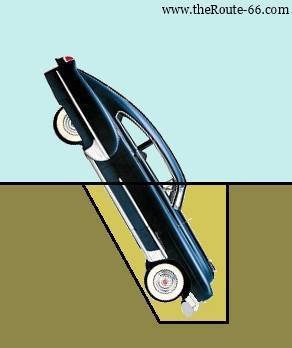
A Buried 1948 Cadillac, A. Whittall
Angle of Inclination of the Cars
The cars are supposed to be tilted at exactly the same angle as that of the faces of the Great Pyramid of Khufu, in Cairo, Egypt.
The angle is usually given as 52°, but it is, according to R. Greenberg, 51° 50' and 40".
Time goes by at the Caddy Ranch
The cars did not remain untouched for long, shortly after 1976, visitors started painting graffiti on them, and there was no way to protect the cars.
The Cadillacs were repainted over the years, with many different colors and hues. Pink was quite popular, so was red. But the graffiti would return, every time.
When they were moved in 1997 the effects of 23 years of water and weathering were noticeable.
Tailfin, the craze of post war America
Tailfins appeared as an appendage on cars shortly after the end of World War II. Streamlined aircraft were the source that inspired the fad (quite a long fad indeed; it lasted for almost 20 years).
Cadillac Tailfin, extravagant design from the 1950s

Cadillac Tailfins: their evolution

The first model to carry a tailfin was the 1948 Cadillac. Harley Earl, a GM designer was inspired by a US fighter plane, the P-38 "Lightning". It had two rounded rudders which caught Earl's eye at the Selfridge airfield in the late 1930s.
After the war, Earl incorporated them as two bulbous fins; actually they were very discreet upward humps on the tail panel. But they were a success and the industry and consumers embraced them.
Cadillac Ranch Fire - 2019
September 8, 2019 around 2 AM, the oldest of the ten cadillacs was set aflame by an arsonist.
However the blaze did not damage the structure of the car, which still stands, as a testimony of art vs. vandalism.
Potter County Sheriffs Office has not yet found the culprit even though a reward had been offered.

Other "imitations" of the Cadillac Ranch
There are other similar structures on Route 66, they are all a homage to the original artwork.
Parody: the "Buggy Ranch"
I-40 Exit 96, along South frontage road before TX-207. Conway, TX. map marking the spot
The Buggy Farm in Conway Texas, on Route 66, east of Amarillo is a parody of the Cadillac Ranch.
It is known as the Bug Farm, Buggy Ranch, and Bug Ranch and it consists of five Volkswagen "beetles" buried nose-down in the ground. They too are covered with graffiti.
View of the "Buggy Ranch" a parody of the Cadillac Ranch
Bug Ranch, Graffiti covered Beetles nose down in the ground, Conway Texas
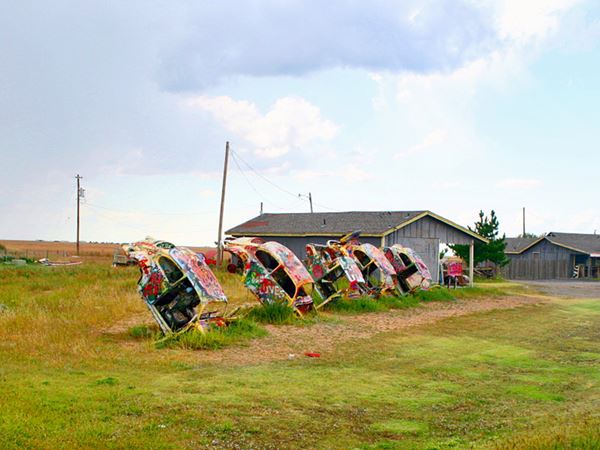
Another Parody: the "Rabbit Ranch"
1107 Historic Old Route 66, Staunton, IL.
Far from Texas, in Illinois, Rich and Linda Henry own Henry’s Rabbit Ranch, a post that deals with highway and trucking memorabilia plus a replica of a vintage gasoline station.
It has plenty of classic highway items and a selection of Route 66 collectibles and gifts.
Among the trucks and cars are a set of six cars half-buried in the ground, with four facing one way and two the other. They are almost vertical, and are of different makes.
Cars buried nose-down in the ground:
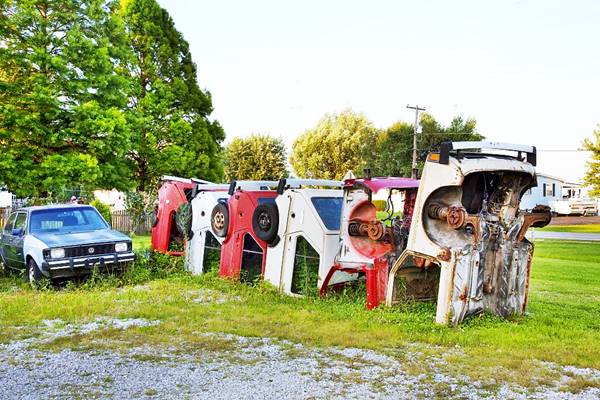
John's Place
OK County 66 - John's Place in Arcadia, Oklahoma has a buried VW beetle.

Buried Beetle, at John's Place, Arcadia Oklahoma, Source

Carhenge, Nebraska. Source
Carhenge
2151 Co Rd 59, Alliance, Nebraska.
Carhenge (after "Stonehenge" England, but built with cars instead of slabs of stone) is not on Route 66, it is located in Nebraska, it dates back to 1987. It consists of buried and stacked cars. See picture above.
Where to Stay: Accommodation
Accommodation close to the Cadillac Ranch in nearby Amarillo: There are plenty of hotels in the town
Motels and Hotels in Amarillo:
>> Book your Hotel in Amarillo
Find your Accommodation
The towns along Route 66 in Texas offer different lodging options. Check out some of the hotels and motels in the main towns below listed from east to west
In Texas Along Route 66
Sponsored Content

>> Book your Hotel in Amarillo Texas

Credits
Cadillac Database, Saunders & Franchitti.
Cadillac Ranch at 50 Amarillo Museum of Art, AMOA.
Sonia Smith, (2014). Forty Years of the Cadillac Ranch; Texas Monthly. 08.18.14
Ralph Greenberg, 2000. The Slopes of the Egyptian Pyramids
Banner image: Hackberry General Store, Hackberry, California by Perla Eichenblat

